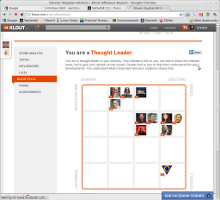The new, improved Klout


You may not buy that your Klout score matters. Too bad. Employers and bosses do pay attention to the social network “Standard for Influence” measurements. And, since Klout has just changed its scoring system and is adding new features. you should too.
In a blog posting by Klout CEO Joe Fernandez, he announced that “we're introducing some of the most significant product updates in Klout’s history. With these updates, we’ve concentrated on helping everyone to gain a clearer, more accurate understanding of how they influence other people through the ideas they share.”
Specifically, “The updated Klout Score now includes significantly broader data sets and signals, including our first steps towards including real-world influence. We now include many more actions from Facebook, Twitter, Google+ and more, and for the first time incorporate Wikipedia as a signal."
Cutting to the chase, and your Klout score, Fernandez wrote, “We have increased the number of social media signals we analyze from less than 100 to more than 400. We have also increased the number of data points we analyze on a daily basis from 1 billion to 12 billion. All of this additional data helps us deliver a more accurate Score for everyone on Klout.”
In the updated Klout Score page, the company explains this in more detail:
As before, “The Klout Score is a number from 1-100 that represents the aggregation of multiple pieces of data about your social network activity. We compute the Klout Score by applying our score model to these signals.”
Some of the top signals are:
Facebook:
Mentions: A mention of your name in a post indicates an effort to engage with you directly.
Likes: The simplest action that shows engagement with the content you create.
Comments: As a reaction to content you share, comments also reflect direct engagement by your network.
Subscribers: Subscriber count is a more persistent measure of influence that grows over time.
Wall Posts: Posts to your wall indicate both influence and engagement.
Friends: Friend count measures the reach of your network but is less important than how your network engages with your content.
Twitter:
Retweets: Retweets increase your influence by exposing your content to extended follower networks.
Mentions: People seeking your attention by mentioning you is a strong signal of influence. We also take into account the differences in types of mentions, including “via” and “cc”.
List Memberships: Being included on lists curated by other users demonstrates your areas of influence.
Followers: Follower count is one factor in your Score, but we heavily favor engagement over size of audience.
Replies: Replies show that you are consistently engaging your network with quality content.
Google+:
Comments: As a reaction to content you share, comments also reflect direct engagement by your network.
+1's: The simplest action that shows engagement with the content you create.
Reshares: Reshares increase your influence by exposing your content to extended networks on Google+.
LinkedIn:
Title: Your reported title on LinkedIn is a signal of your real-world influence and is persistent.
Connections: Your connection graph helps validate your real-world influence.
Recommenders: The recommenders in your network add additional signals to the contribution LinkedIn makes to your Score.
Comments: As a reaction to content you share, comments also reflect direct engagement by your network.
As for real world influence, Fernandez explained that Klout is now using Wikipedia to help set its score. “Our long-term goal is to understand and analyze all the world’s influence, both online and offline. Today, we are entering the early stages of incorporating real-world influence into the Klout Score by integrating Wikipedia. We see a Wikipedia entry as a significant indicator of one’s ability to drive action in the real world. We’ve tested this method over the past several months and the updated Scores of recognized world leaders like Barack Obama and Warren Buffett more accurately reflect their real-world influence.”
There wer good reasons to make this change. For example, Warren Buffett may not tweet that often but the multi-billionaire is still important. Buffett has a Klout of 76, even with only a few hundred followers -- though he's still not as hot as teen idol Justin Bieber, with his millions of followers in the socialverse and Klout of 92.
Besides adjusting the scores to reflect real world values of fame Klout is also starting to offer new features. These include Moments, which lets you see which particular social media posts in the last 90 days garnered attention and Insights, a new design designed to make it easier to see what's going on in your social networks.
So does it work? Well, my score went up so, of course, I'm happy, but others aren't so sure. Some think that Klout replies too much on one or the other social network. On Google+, a Klout representative responded to this claim: “The Klout Score is based off of the networks that you drive the most engagement on your posts. This differs per each different user depending on where most of their engagement is driven. With the updated design and moments, it will give you better insight of where your most influential content is coming from that is contributing to the Klout Score.”
The Klout site itself is clearly overburdened. I've seen multiple time-out failures. In addition, the new features aren't available to many users yet. The new scores, however, are out now for everyone as far as I've been able to tell.
Again, does it matter? Again, I can only say that while you may not care about it, or its competitor PROskore, for anyone in a public-facing or high-profile job, a high Klout score does, for better or worse, matter.
Related Stories:
Klouchebag: The un-social social network measurement tool
Do you trust Klout enough to measure influence in your team?
Klout influence gets bigger with Blockboard acquisition
Klout confirms completing new major round of funding
Klout Craziness